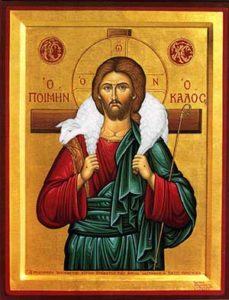Jesus, the Loving Shepherd
Podcast: Play in new window | Download
Subscribe: RSS
 Date written: August 28th, 2004
Date written: August 28th, 2004
SUBJECT: Jesus
TITLE: “Jesus, The Loving Shepherd”
PROPOSITION: Jesus is the loving Shepherd because 1) He supplies all of our needs (providence), 2) He defends us from harm (protection), 3) He lays down his life for us (preservation).
OBJECTIVE: Each hearer should be able to state why Jesus is the loving.
AIM: To encourage each to understand Jesus as the loving Shepherd.
INTRODUCTION:
1. Read: Psalm 23
2. About the Text:
1) Here is a very familiar passage of scripture to us all.
2) We see pictured in this Psalm, the Lord as Shepherd.
3) It was an occupation with which David was familiar.
4) The Psalm illustrates for us God’s providence, protection, and preservation of His people.
5) Many believe that this Psalm is Messianic.
6) Jesus said in John 10:11, 14 “I am the good shepherd.”
7) There were two words for “good” in the Greek language.
a. AGATHOS signified that which was morally good.
b. KALOS signified that which represented excellence.
c. Jesus is the good (KALOS) shepherd—that is, He is the excellent shepherd.
d. At shepherding, there is none better than He.
3. Ref. to S, T, P, O, and A.
DISCUSSION: Jesus is the loving Shepherd because …
I. He supplies all of our needs (providence) he doesn’t satisfy our wants.
1. “And my God shall supply all your need according to His riches in glory by Christ Jesus” (Philippians 4:19).
2. Difference between a need and a want.
1) We must not confuse the difference between a need and a want.
2) I need food to survive, but I don’t need to eat at McDonalds to survive.
3) I may WANT to eat at McDonalds, but that doesn’t mean I need it
4) Many churches today are confusing people’s needs with people’s wants.
5) Jesus supplies all of our needs, not all of our wants.
3. Difference between supplying and satisfying.
1) Children of Israel and manna—supplied, but not satisfied. (Numbers 11)
2) So they murmured against God (Numbers 11, 1 Cor.10:10).
3) They were supplied, but not satisfied.
4) We need to make sure that we understand what our true NEEDS are and be satisfied with those being met, then if God blesses us with more, we can be thankful.
5) Hebrews 13:5 “Let your conversation (manner of life) be without covetousness; and be content with such things as ye have: for he hath said, I will never leave thee, nor forsake thee.”
4. Jesus has promised to supply all of our physical needs (Matthew 6:19-34).
5. Our greatest need is salvation.
1) It is our sin that separates us from God (Isaiah 59:2).
2) We cannot stand before God with our own righteousness.
3) All our righteousness is as filthy rags (Isaiah 64:6).
4) Romans 7:24-8:1 “O wretched man that I am! who shall deliver me from the body of this death? I thank God through Jesus Christ our Lord. So then with the mind I myself serve the law of God; but with the flesh the law of sin. There is therefore now no condemnation to them which are in Christ Jesus, who walk not after the flesh, but after the Spirit.”
II. He defends us from all harm (protection).
1. House smoke alarm defends us from fire if we install and change batteries regularly.
2. External harm.
1) 1 Sam.17:34-36 – David spoke of bears and lions coming to take sheep.
2) Remember Israel and Egypt. (Exodus 1-12). God delivered them from the Egyptians.
3) Jesus warned us about false prophets in Matthew 7:15 “Beware of false prophets, which come to you in sheep’s clothing, but inwardly they are ravening wolves.”
4) 2 Peter 2:9 “the Lord knows how to deliver the godly out of temptations and to reserve the unjust under punishment for the day of judgment.”
5) Jesus protects us, when we seek to do everything according to his will (John 15:1-7).
3. Internal harm.
1) One sheep turns on the others.
2) Korah, Dathan, and Abirum in Numbers 16:1ff. (read 1-3).
3) Sometimes we have those who turn upon our own – Acts 20:28-31.
4) Jesus protects us when we seek to do all things by his authority (Col.3:17).
5) Hebrews 3:13 – “exhort one another.”
4. Self harm.
1) Matthew 18:12, Luke 15:4 – Jesus seeks the sheep who go astray.
2) Jesus protects us from self harm when we…
a. Humble ourselves before him (James 4:10).
b. Set our minds on the things above (Col.3:1-4).
c. Transform our lives to his will (Romans 12:1, 2).
III. He laid down his life for us (preservation) to take it up and conquer death.
1. There is no human analogy for this.
1) Shepherds who are killed protecting their flock, but their flock still gets destroyed.
2) Some die trying to save others, but then, sadly, the one’s they try to save die too.
3) Such is not the case with Jesus. Death had no dominion over him (Romans 6:8-11).
2. The good shepherd lays down his life for the sheep.
1) Jesus did this when he gave his life-blood on the cross.
2) 1 Cor.15:3 – Christ died for our sins.
3) Gal.1:4 – he delivered us from this present evil world.
4) 1 Peter 2:24 – so that we could live to righteousness
5) Titus 2:14 – and purify a peculiar people zealous of good works
3. But Jesus’ life wasn’t laid down to stay down. He rose again!
1) John 10:17, 18 – take his life again.
2) Acts 2:30 – risen to sit at the right hand of God
3) Acts 17:31 – risen to be the judge of all men.
4) Revelation 17:14 – risen to be King of kings.
5) Hebrews 13:20, 21 – risen to be the great Shepherd of the sheep!
CONCLUSION:
1. Jesus is the Good Shepherd because…
1) He supplies all of our needs.
2) He defends us from harm.
3) He laid down His life for us.
2. Invitation
1) Are you a sheep that has gone wandering astray?
2) Jesus is searching for you. Won’t you repent this hour?
3) If you are not a Christian this morning . . .
a. Return to the shepherd and bishop of your soul! (1 Peter 2:25).
b. Come into his fold today!
a) Hear the word; Romans 10:17 “Faith comes by hearing . . .”
b) Believe with all your heart; Hebrews 11:6 “For without faith it is impossible . . . .”
c) Repent of your sins (Acts 17:30).
d) Confess Jesus as the Son of God (Matt.16:16).
e) Be Baptized for the remission of your sins (Mark 16:15,16).

